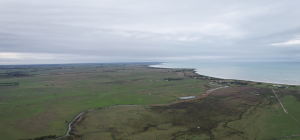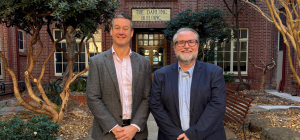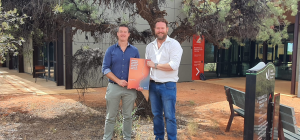In a world first, sharp-tailed sandpipers have been tracked using satellite trackers as they move around the Coorong and neighbouring wetlands before migrating to Siberia to breed. The shorebird tracking program is part of a suite of field research Goyder Institute for Water Research scientists have been undertaking in the Coorong over the summer to help efforts to restore the iconic wetland.
The Goyder Institute’s research is part of the Healthy Coorong, Healthy Basin program, a joint initiative of the Australian and South Australian Governments to restore the health of the Coorong which is a wetland of national and international importance. The research brings together scientists from UniSA, The University of Adelaide, Flinders University, SARDI and CSIRO and beyond to fill gaps in our understanding of the Coorong, help protect its ecological character and develop long term management solutions to improve the health of the Coorong.
Shorebirds, like the sharp-tailed sandpiper, are an integral component of the Coorong’s diverse waterbird assemblage. While many waterbird species have been increasing in number in the Coorong since the Millennium Drought ended, shorebirds are the exception. Drs Thomas Prowse and Rowan Mott, University of Adelaide, are part of a team of scientists aiming to track the movement of four Coorong waterbird species using satellite and GPS trackers – a significant step forward from traditional banding methods that rely on people spotting the birds using binoculars and reporting back.
“We’ve just started to catch and tag sharp-tailed sandpipers. They’re a migratory shorebird and are just taking off now on their long trip back to Siberia to breed,” said Dr Prowse.
“We’re using the sharp-tailed sandpiper as a general indicator species to learn how shorebirds are using the Coorong and the network of wetlands around it, and to identify stopping points in their migration,” he said.
Small satellite trackers, weighing just two grams, have been placed on the animals who themselves only weigh between 50 and 100 grams. Already the work is paying off, with the team tracking one bird from the southern portion of the North Coorong Lagoon to Lake Alexandrina, south of Wellington, east of Lake Eyre and now a couple of kilometres to the west of the Birdsville Track. Another tracked individual has flown to a site just north of Tennant Creek in the Northern Territory.

“This work should give us a much finer scale understanding of how birds are using the Coorong and the broader network of wetlands. We’re hoping that the data from the tracking studies does start people thinking about how to manage these wetlands in an integrated way,” said Dr Mott.
But the work is not without its challenges. Shorebirds feed along the waterline, away from vegetation and are very wary, so they’re very hard to catch.
“Sometimes we accidentally startle the birds as we’re setting up traps at the waterline. Once they’re gone, they might not return that day.”
“Another approach to catching birds is hand-netting. You creep up on them in the dark and try to drop a net over them by hand. It’s pretty challenging,” said Dr Mott.
The University of Adelaide team are also collaborating with Professor Sabine Dittmann (Flinders University) and Associate Professor Qifeng Ye (SARDI) to investigate what food is available for waterbirds at different sites along the Coorong, how much energy the birds can obtain from different food items, and the rate at which birds catch and ingest food.
“If we can understand where the birds are foraging, and what and how much prey they’re eating, then we can estimate their actual energy intake rates in the South and North Lagoon,” said Dr Prowse
“We can then compare those estimates to what we expect their energy intake needs to be to allow them to fatten up before their long migration from the Coorong to Siberia.”
Contact Dr Thomas Prowse, The University of Adelaide, for more information about the shorebird tracking program or Dr Alec Rolston, Acting Director, Goyder Institute for Water Research for more information about the Institute’s Healthy Coorong Healthy Basin Scientific Trials and Investigations program.
This project is part of the South Australian Government’s Healthy Coorong, Healthy Basin Program, which is jointly funded by the Australian and South Australian governments.



